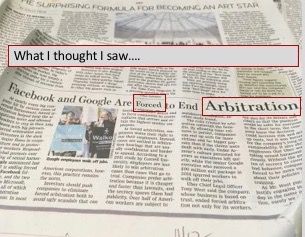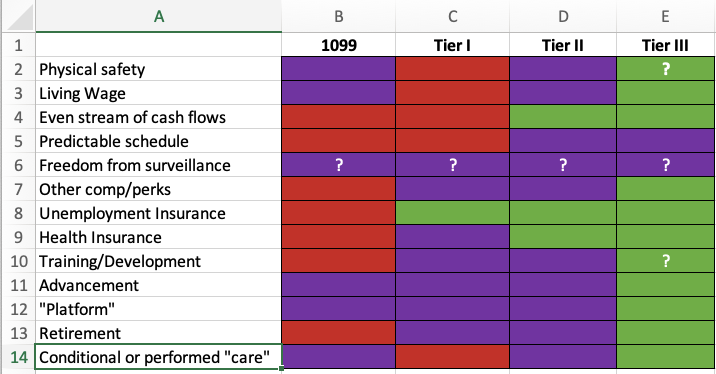History Is For Us To Make, Every Day: Members Only #6
When I was an emerging manager, a bunch of Baby Boomers invested thousands of hours in me. My bosses and others were present and available.
They’re icons in my memory. Grizzled elders, holders of wisdom. (They were mostly in their 40s and early 50s, lol.)
Their wisdom was practical. Any company training was leavened with experience. MBAs were rare. Some had gone to Vietnam instead of college.
They weren’t perfect. And that’s important.
You don’t have to be “world class” to be a good manager and developer of people. You’ll get more than halfway there by investing time in your team members, and making a commitment to learning.
I’ve been working on a better articulation of what I do, and what I stand for. For my IRL work, and also here.
Most organizations I travel through are closely held. People don’t have decades of experience. That’s part of what I’m there for.
And it’s part of what I’m trying to be here for. To be that grizzled elder.
Or maybe a cool aunt.
Andy-land
So, rather than live-tweeting High Output Management, I’ve decided to report back here, 50 pages at a time. (Click here for thoughts on first 50 pages.)
Pages 51-100, while solid, were a real yawn. And I mean, I actually nodded off a couple of times while reading. In the middle of the day.
Maybe because the topics are so familiar. Why meetings — and particularly 1:1s — are useful. Optimal number of direct reports. Management as leverage. Delegation.
Yada.
When Andy Grove started talking about making decisions, it got kind of interesting for me.
He loves a model. (Same, tbh.) His decision model involves progressing through a cycle of “free discussion, clear decision, full support.” A wrong decision triggers this cycle to repeat.
I frequently encounter people who deny their own positional power. Early in my career, I naively did the same thing.
Andy Grove didn’t.
Grove wanted to imbue decisions with expert opinions. Knowing that subject matter experts aren’t always in a good spot on the org chart, he designated them as having “knowledge power.”
Open debate, in my reading of 100 pages of Grove’s view, is like a very specific fulcrum: giving equal weight to positional power and knowledge power puts everything in balance.
This is not how power works. Someone must place the fulcrum.
Maybe Andy’s process worked, for Andy, because he held a lever that could amplify expert voices: his own positional power, as the process designer.
Or at least that’s my educated hypothesis.
This is how sponsorship works. And sponsorship is part of how power works.
What worked for Andy may not work for you. Or it may work for you in one organization, but not in another. Context matters.
Andy also uses the word “egalitarian” to describe the Intel culture of his time. Add in free discussion, and it feels like we have the seeds of “meritocracy.”
In meritocracy, surely free discussion will surface the best ideas. Not just the loudest voices.
You and the CEO’s bro will be heard equally.

Um.
This got me thinking about what an extraordinary person Andy seems to have been. Then, I fell into Internet, and then the footnotes on Wikipedia.
For one thing, Grove has been called “The Father of OKRs.”
Well, I thought, that’s BS.
SMART objectives arose before my business career did. I remember my boss walking me through how she had constructed her MBOs, short for Management by Objectives. Back in the dark ages of the 90s, we had metrics, too.
Wikipedia tells me that Peter Drucker wrote about MBOs in 1954. The footnotes pointed to an paper on the history of the MBO by William LaFollette and Richard Fleming — in 1977 — who were trying to figure out whether (in my words) Drucker was the Father of the MBO.
Also, one of Drucker’s influences was Mary Parker Follett, who died in the 1932.
Why does it not surprise me that there’s a Mother of Modern Management, and that I’d never heard of her?
Have you? (See also: Lillian Gilbreth.)
Reader, I got a copy of that paper, and will dig more deeply.
And I still don’t know why we’re reading High Output Management today.
Might it be because we want to read history in a sort of Choose Your Own Adventure sort of way? idk, but I’ll be back next time with the next 50 pages.
OK Google
After years of using Twitter as a news-reader, I’ve been reading the actual paper. Some things that catch my eye aren’t really there. At least not on the page.
One headline read Facebook and Google are Right To End Forced Arbitration.

Managing up hadn’t worked. When Google employees (and contractors) walked off the job on November 1, they were managing out.
(NB: free discussion apparently hadn’t worked, either.)
CEO Sundar Pichai’s decision to support the walkout fascinated me.
IMO it was his only move. If only to shore up Google’s employer brand, though I’m sure it was #complicated.
On November 8, Pichai answered.
Organizers pushed back: Google management had “erased” some of their core concerns about racism and how contractors are treated. Stay tuned.
Long after Monday morning quarterbacking (like this) disappears from the Internet, Pichai’s weighty decision will be a data point in labor history. IMO.
Pre-history, though, we’ll see reverberation in other companies and industries.
Watch banking. Tech and finance both prize already-trained employees with very specific skills, and new grads from a small world of elite universities.
I doubt people will march out the doors of financial institutions, protest-style.
The walkout is ongoing, and more subtle. And, banking also has entry-level recruiting problems.
At the other end of the financial spectrum, Walmart is starting to roll out employee work schedules that are stable for 13 weeks.
Steadier schedules and shift-swapping via mobile have been popular, said workers and executives. “It’s life-changing,” and helps recruiting because workers can predict their paychecks or make a doctor’s appointment, said Yolanda Evans, a market manager for Walmart stores in the Erie, Pa., area.
This is not the first move Walmart has made that nods to difficulties employers create by designing jobs to have uneven salaries.
Back of the envelope calculation: 20% of Google’s workforce participated in the November 1 walkout.
Or was it? Per walkout organizers:
Contract workers make up more than half of Google’s workforce, and perform essential roles across the company, but receive few of the benefits associated with tech company employment. They are also largely people of color, immigrants, and people from working class backgrounds.
While Google’s response to the protests did mention contractors, organizers stated that Google had “erased” concerns about racism and a two-class system in the Google culture.
Did you know that contractors in the US have few legal protections against harassment?
And, I’m Still Not Reading *Blitzscaling*
“…But the bigger gift in being a student of history is this: You look deeply enough into the past to understand that things could have been otherwise. That no matter how ineluctable a series of events will seem in retrospect, they were absolutely contingent, dependent on all kinds of forces that include pure chance….”
Sara Hendren History as Contingency
The notion that Andy Grove is the Father of the OKR gave me another noodge to think about the history of management. I’ve written about my experience of military culture in corporate life, and pondered the military influence on how we manage today.
And I’ve given thought to the “management science” behind human atrocities. (Eric Fair’s Consequence comes immediately to mind.)
This month, I’m not reading Blitzscaling because I’m reading Caitlin Rosenthal’s Accounting for Slavery (library) (Indiebound).
And I’ve also been reading about current events in coerced labor.
In a mythscape of unicorns, flying cars, robots and more, we can influence the future to become “otherwise.”
Links
- Judy Woodruff talks with Katie Benner of The NY Times on the day of the Google walkouts. The PBS News Hour is one of my replacements for Twitter-as-news-feed. On Judy’s watch at the News Hour, female reporters and commentators are a force. JUDY WOODRUFF IS A NATIONAL TREASURE.
- My favorite delegation classic, William J. Oncken’s Management Time: Who’s Got The Monkey predates High Output Management by about a decade.
- “About half of Google’s workers are contractors who don’t receive the same benefits as direct employees,” Inside Google’s Shadow Workforce.
- “We are not going to have any f-ing salespeople.” Oh, ok, Palantir.
Recommend
- Enough With All the Innovation and disruption in your university incubators and such. I’m eagerly awaiting John Patrick Leary’s Keywords: The New Language of Capitalism (not yet published.)
- After starting to make audios for the newsletter a couple of years back, I devoured Jessica Abel’s podcast Out on the Wire. It gives shape to the hundreds of hours of expertise that go into creating stories for This American Life. How Podcasts Became a Seductive—and Sometimes Slippery—Mode of Storytelling is a good companion piece.
- My sister tried to explain what it was about, but I had to see it. Her friend had turned her suburban garage into a showroom. Hundreds of pairs of leggings hung on garment racks. It was a multi-level-marketing thing. (Lol, Tupper-wear.) I left the garage with a free pair of weirdly patterned leggings, and later read an extensive article about the leggings company. New podcast The Dream traces the history of MLMs, and engages with people who get involved. I saw a lot of gig economy parallels.
Office Hours and so forth
Thank you so much for supporting my work!
These newsletters are for you. If I can share your work here, or elsewhere, please drop me a note. Also bring on your questions, suggestions, or ideas for how the newsletter can bring you more value.
- Office Hours are on November 29.
- In my studies of email newsletters, I’ve noticed that men are far likelier to put their “asks” up front. On trend: if you like my newsletter, please do share your like-age on social media!
Something seems a little funky with the gifs this time, I’ve alerted the good folks at Substack that they look a bit grainy. Hopefully this bug will be zapped by next time.
If you’re in the US, I wish you a peaceful holiday week. If you’re outside the US, I hope that we’re quieter for your sake, too.
Many, many thanks,
Anne
P.S. I have not used affiliate links in this email.
ICYMI, the last 3 emails
- The Superpower of 1:1 Meetings: On Management #32 (November 3)
- Pattern Recognition, Members Only #5 (October 13)
- Slowness, Speed and Structure: On Management #31 (Sep 30)
- (the rest of the archive, which I’m slowly repopulating with the pre-Substack emails, is here)

No Google walkouts on Giphy? I couldn’t even, so I uploaded one.




